|
|
|
Sort Order |
|
|
|
Items / Page
|
|
|
|
|
|
|
| Srl | Item |
| 1 |
ID:
120196
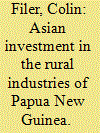

|
|
|
|
|
| Publication |
2013.
|
| Summary/Abstract |
One part of the Australian colonial legacy in PNG is the Australian government's attempt to forge partnerships with different groups of foreign companies in different economic sectors in order to lay the economic foundations for rural development in the newly independent nation. American and Australian capital was invited to develop the mining industry, European capital to develop the oil palm industry, and Japanese capital to develop the forest industry. Nowadays, the Australian government seems to have forgotten its late colonial enthusiasm for this form of state capitalism, and its aid to PNG is largely framed by the neo-liberal policy prescriptions which the World Bank was able to impose on the PNG government through a sequence of structural adjustment programs beginning in 1990. However, members of PNG's national political elite have persistently sought refuge from this economic orthodoxy through their engagement with Asian governments and companies. In this paper I examine the way in which changing political and economic conditions have affected the actual pattern of Asian investment in PNG's forestry and agriculture sectors, and the way in which different stakeholders have responded to this changing pattern of investment. Despite the prevalence of a policy narrative which holds Asian investors responsible for the corruption of PNG's political institutions when mineral resource booms liberate national politicians from the constraints of Western economic orthodoxy, I show that Asian investment in these two sectors has taken several different forms, and there is no simple sense in which PNG's national economy and political system are subject to a concerted takeover by Asian business interests.
|
|
|
|
|
|
|
|
|
|
|
|
|
|
|
|
| 2 |
ID:
120198
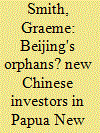

|
|
|
|
|
| Publication |
2013.
|
| Summary/Abstract |
This paper will explore the perspectives and narratives developed by three different sets of Chinese investors in Papua New Guinea (PNG): investors in the retail, mining, and construction sectors. It is estimated that 90 per cent of new Chinese private investors in the PNG retail sector hail from Fuqing, a coastal community in Fujian province with a long history of transnational migration. Larger state-owned mining ventures and construction companies draw on a more disparate workforce, even though they are headquartered in Beijing. All three sets of investors face different degrees of stigmatization from their competitors, the media, and different Chinese and local actors. Based on interviews with Chinese investors in PNG and China, and drawing on Chinese scholarly studies, this paper will explore the interaction of these three groups of investors with Chinese state and non-state actors, and evaluate how this shapes the process of "localization." The paper will examine how relations with state and non-state actors in PNG are evolving over time, as both groups find ways to "get things done" in a country where mainland Chinese investors have a short history of engagement.
|
|
|
|
|
|
|
|
|
|
|
|
|
|
|
|
| 3 |
ID:
120199
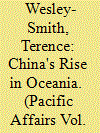

|
|
|
|
|
| Publication |
2013.
|
| Summary/Abstract |
This paper identifies a broad context for assessing China's increased interest in the Pacific Islands, and examines some of the major implications for regional security, regional politics, western influence, and self determination in the region. It argues that Beijing's policy towards the Pacific is not driven by strategic competition with the United States, as some have maintained. Nor is it reducible to a specific set of interests centered on natural resources and, especially, competition with Taiwan. Although these factors are important, China's activities in the region are best understood as part of a much larger outreach to the developing world that is likely to endure and intensify. The paper suggests that China's rise is generally welcomed by island leaders, and makes the case that it offers island states economic and political opportunities not available under established structures of power and influence.
|
|
|
|
|
|
|
|
|
|
|
|
|
|
|
|
| 4 |
ID:
120192
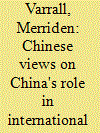

|
|
|
|
|
| Publication |
2013.
|
| Summary/Abstract |
China's increasing role as a provider of overseas aid is the subject of considerable debate both within and outside of China. However, despite research activity examining how Chinese aid is materialised, very little is actually known about why Chinese aid projects are developed or implemented the way they are. Although recent indications suggest the Chinese government is increasingly willing to be more open about overseas aid, for example, the release of the first White Paper on Foreign Aid in 2011, external observers remain largely unaware of the values, goals and motivations behind Chinese aid projects. Alongside this lack of information, non-Chinese analyses tend to be founded on a Realist approach to understanding international relations in which a 'rising power' such as China automatically constitutes a threat to existing power relations. As a result, many scholars conclude that China's aid is part of a strategic quest to further its own geopolitical ends. This paper provides insights into the contentious topic of the drivers behind Chinese overseas development assistance. It finds that Chinese elites in the international development sphere do not share the views prevalent in Western international relations discourse about the international system and China's role within it. This article argues that exploring Chinese development actors' and commentators' conceptions of what development means, along with their views on China's role and obligations within the international system, allows a better understanding of the motivations behind Chinese aid, and a re-examination of some of the misconceptions around Chinese aid as a tool of Chinese geopolitical strategy.
|
|
|
|
|
|
|
|
|
|
|
|
|
|
|
|
| 5 |
ID:
120193


|
|
|
|
|
| Publication |
2013.
|
| Summary/Abstract |
In 1991, the state-owned China National Petroleum Corporation (CNPC) commenced the first Chinese National Oil Company (NOC) equity oil investment overseas when they invested in a UN-sponsored oil sands project in Canada. Since then, CNPC and the other Chinese NOCs (Sinopec & CNOOC) have steadily increased their equity oil investments in developing nations, sometimes with the assistance of various Chinese party and government organs. Viewed in the context of China's burgeoning oil consumption and plateauing oil production, these investments have led to accusations by Western analysts and policymakers that China is engaging in "mercantilism" by "locking up" oil supplies from vulnerable developing nations to assuage their mounting energy-security woes.
Through examining Chinese oil-engagement in Kazakhstan, this paper will analyse whether accusations of "mercantilism" can adequately capture the complexities and dynamics that drive Chinese NOC investment in developing nations. This will be achieved by first surveying contemporary debates regarding Chinese oil-engagement abroad and then linking these debates to historical and contemporary conceptualisations of mercantilism. This will allow for a new multi-faceted definition of "oil mercantilist" behaviour, which will shift the label from a statement of ethical value to a statement of empirical fact that can be tested. This definition will then be used to examine the institutional contexts in China that support and counter contemporary accusations of oil mercantilism, and then to explore Chinese oil-engagement in Kazakhstan from 1996 to the present day. This paper will contribute to emerging literature that suggests Chinese oil investment and diplomacy cannot be simply understood through mercantilist perspectives. Analyses of Chinese oil engagement need to recognise the important influence that China's institutional reforms have had on Chinese NOCs' increasingly commercial approach to foreign investment, in addition to the unique host-country contexts China encounters through its oil investments.
|
|
|
|
|
|
|
|
|
|
|
|
|
|
|
|
| 6 |
ID:
120191
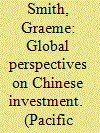

|
|
|
|
|
| Publication |
2013.
|
| Summary/Abstract |
This introduction outlines some of the more influential academic studies on Chinese investment abroad, including the existing quantitative literature on Chinese outbound direct investment (ODI). It introduces a case study from Australia involving state-owned mining conglomerate Chinalco, and the fallout from its failed bid for a share in Rio Tinto. The study confounds many of stereotypes about the behaviour of the Chinese central state. We go on to suggest frameworks developed in the study of China's domestic political economy that may be useful in analyzing the behaviour of Chinese state and non-state actors abroad. Such frameworks can help in understanding how Chinese investors develop informal institutions, and make use of existing formal institutions, to "get things done" in unfamiliar investment environments.
|
|
|
|
|
|
|
|
|
|
|
|
|
|
|
|
| 7 |
ID:
120195


|
|
|
|
|
| Publication |
2013.
|
| Summary/Abstract |
This article traces the evolution of China's policies aimed at promoting corporate social responsibility and sustainable investments, while assessing the extent to which its regulatory regime has succeeded in influencing the investment strategies of Chinese national companies across the developing world, specifically in Africa and the Mekong region. In an attempt to improve its international reputation, the Chinese government has stepped up its initiatives in recent years to oversee the practices of Chinese companies abroad and reorient the country's policies towards greater corporate responsibility. But while promising, these efforts have been largely impeded by weak policy implementation. As evinced from the African mining sector and the Mekong's hydropower industry, the diversity of corporate actors and their relative autonomy in making investment decisions, combined with lax governance in host countries and a long-standing concern with national development, have worked to hinder the effective regulation of Chinese overseas investments. Yet, that China, as a new country of origin of ODI, and Chinese firms are now making commitments to CSR and sustainability remains significant, indicating an important development in the country's "Going Global" strategy.
|
|
|
|
|
|
|
|
|
|
|
|
|
|
|
|
|
|
|
|
|